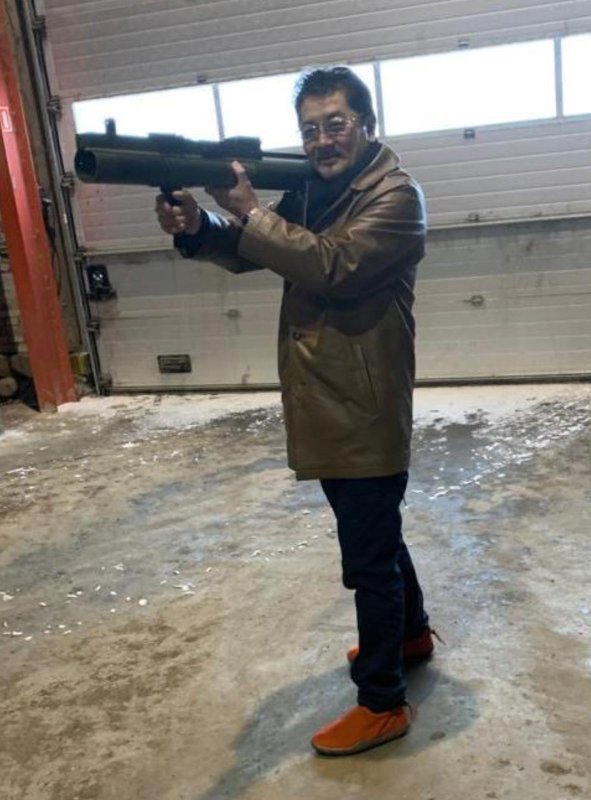1 of 2 | Takeshi Ebisawa, 60, of Japan pleaded guilty Wednesday in a Manhattan courtroom to charges of drug, weapons and nuclear material trafficking. Photo courtesy of U.S. Department of Justice
Jan. 9 (UPI) — A leader of Japan’s Yakuza crime syndicate who tried to sell Iran weapons-grade plutonium has pleaded guilty to charges of trafficking narcotics, weapons and nuclear material.
Takeshi Ebisawa, 60, of Japan entered his guilty plea Wednesday in a Manhattan courtroom to six federal conspiracy and trafficking counts, for which he now faces decades in prison when sentenced.
The development comes more than two years after Ebisawa was arrested and initially charged with drug and weapons trafficking offenses, with a superseding indictment unsealed in February alleging he tried to sell nuclear material secured from Myanmar to an undercover federal agent posing as an Iranian general.
The Drug Enforcement Administration began investigating Ebisawa as far back as 2019 for drug and weapons trafficking violations, discovering his possession of nuclear material in the process.
“Our investigation into Takeshi Ebisawa and his associates exposed the shocking depths of international organized crime from trafficking nuclear materials to fueling the narcotics trade and arming violent insurgents,” DEA Administrator Anne Milgram said in a statement.
According to federal prosecutors, during the DEA investigation, Ebisawa unknowingly introduced undercover agents to his international network of criminal associates in Japan, Thailand, Myanmar, Sri Lanka, the United States and other countries as he tried to arrange large-scale narcotics and weapons deals.
Court documents state that Ebisawa attempted to purchase heavy weaponry, including surface-to-air missiles, that he believed were taken from U.S. bases in Afghanistan for ethnic insurgent groups in Myanmar. As part of the deal, these groups were to pay him, at least in part, with large quantities of heroin and methamphetamine, which were to be sold in the United States.
In 2020, Ebisawa told the undercover agent that he had access to a large quantity of nuclear material he wanted to sell. He later sent pictures depicting the material beside Geiger counters and lab analysis showing the presence of thorium and uranium.
Following repeated inquiries from Ebisawa, the undercover agent agreed to help with the sale of the material to a second undercover agent posing as an Iranian general seeking to use the illegal goods for Tehran’s weapons program.
“Ebisawa then offered to supply the General with ‘plutonium’ that would be even ‘better’ and more ‘powerful’ than uranium for this purpose,” the Justice Department said.
In an early February videoconference, unnamed co-conspirators of Ebisawa told the undercover agent that they had had more than 3,000 kilos of nuclear material and that they could produce as much as five tons in Myanmar, prosecutors said.
A week later, as negotiations continued, one of the co-conspirators showed the undercover agent samples of the material contained in two plastic containers in a Southeast Asia hotel room. These samples were later seized with assistance from Thai authorities and tested by a nuclear forensic laboratory in the United States. The results showed they were weapons-grade plutonium, which, if produced in enough quantity, could be used to make a bomb.
“As he admitted in federal court today, Takeshi Ebisawa brazenly trafficked nuclear material, including weapons-grade plutonium, out of Burma,” said Acting U.S. Attorney Edward Kim for the Southern District of New York, while referring to Myanmar by its other name.
“At the same time, he worked to send massive quantities of heroin and methamphetamine to the United States in exchange for heavy-duty weaponry such as surface-to-air missiles to be used on battlefields in Burma and laundered what he believed to be drug money from New York to Tokyo.
“It is thanks to the extraordinary efforts of the DEA’s Special Operations Division, the career national security prosecutors of this Office, and the cooperation of our law enforcement partners in Indonesia Japan, and Thailand, that Ebisawa’s plot was detected and stopped,” Kim said.
